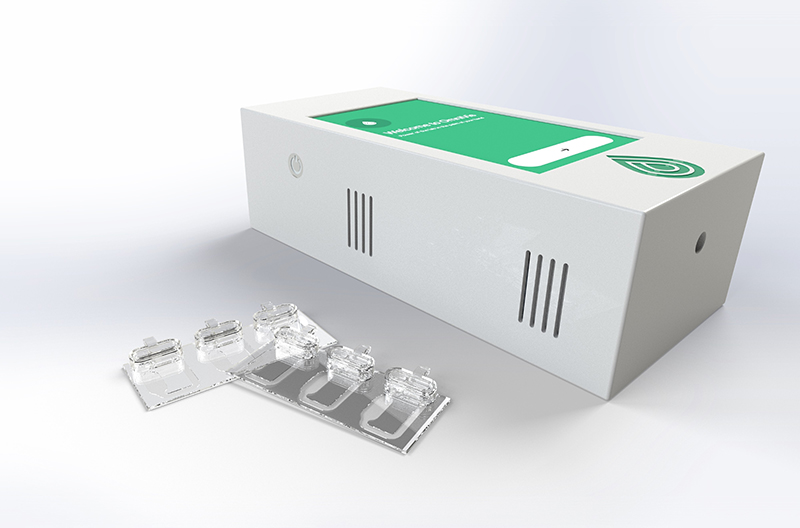South San Francisco, California and West Lafayette, Indiana, USA
January 17, 2023
Purdue University doctoral alumna, three researchers are co-founders of high-tech pathogen detection startup
OmniVis, a Purdue University-affiliated biotechnology company focused on the speed, accuracy and economics of pathogen detection, has been named to the fifth annual Most Fundable Companies list from Pepperdine University’s Graziadio Business School.

The hand-held iSpyDx device enables users to rapidly detect pathogens in food, water and plant samples in less than 40 minutes. High-tech startup OmniVis, which has developed and markets the device, was named to the to the fifth annual Most Fundable Companies list from Pepperdine University’s Graziadio Business School. (OmniVis photo)
OmniVis makes iSpyDx hand-held devices that rapidly detect pathogens in food, water and plant samples. The devices perform to laboratory method standards but do not require special equipment or training.
CEO Katherine Clayton, who earned her PhD in mechanical engineering from Purdue, leads the company. Other co-founders are Purdue researchers Tamara Kinzer-Ursem, associate head for academic programs and the Marta E. Gross Associate Professor of Biomedical Engineering, Weldon School of Biomedical Engineering; Jacqueline Linnes, the Marta E. Gross Associate Professor of Biomedical Engineering, Weldon School of Biomedical Engineering, and director of the College of Engineering Honors Program; and Steven T. Wereley, professor of mechanical engineering, School of Mechanical Engineering.
“The Most Fundable Companies process involved six months of due diligence on OmniVis, providing even further confidence behind everything we are doing at the company,” Clayton said. “By winning the Most Fundable Companies, we were able to extend our network by meeting great entrepreneurs and investors as well as those excited about entrepreneurship. We can’t wait for what comes next.”
Linnes said the technology’s core platform is disease-agnostic and has the ability to detect a variety of DNA and RNA targets.
“When paired with the right sample preparation and primers to amplify nucleic acids, the platform can detect pathogens from food, water and agricultural products, as well as those causing human diseases,” Linnes said. “We have demonstrated the detection of cholera from water samples and malaria, SARS-CoV-2 and HIV from human saliva and blood samples.”
Kinzer-Ursem said the iSpyDx device can be operated without specialized knowledge from the beginning of the detection process to the end.
“We’ve tested the device with a number of domestic and international partners,” Kinzer-Ursem said. “Users with and without technical training are able to use the device.”
Wereley said it is critical to bring university research and innovation to the marketplace. He said there are several options, including launching a company with a recent graduate to run it.
“The benefits of the small company approach are the close relationship between the company and the university researchers, which allows transferral of not just concepts but typically undisclosed know-how from the university to the small company,” Wereley said. “Also, companies have access to different funding streams, including federal SBIR and STTR grants, investors and more that can support research activities at the university.”
OmniVis competed against more than 4,000 early-stage U.S. companies in all 50 states; 16 were recognized. This is the third consecutive year a company with Purdue connections has appeared on the Most Fundable Companies list: Adranos was recognized in 2020, and Amplified Sciences was recognized in 2021.
About OmniVis
At OmniVis, we want to put the power of the lab in the palm of your hand. We believe that early detection is key to pathogen elimination. OmniVis started in 2017 and has been growing ever since. Our team focuses on providing user-centered pathogen detection devices to anyone in the world. We are scientists, engineers, educators, epidemiologists and business professionals with diverse backgrounds and a common vision. Developing affordable and accessible pathogen detection platforms to support global health drives our work every day.
About Purdue University
Purdue University is a top public research institution developing practical solutions to today’s toughest challenges. Ranked in each of the last five years as one of the 10 Most Innovative universities in the United States by U.S. News & World Report, Purdue delivers world-changing research and out-of-this-world discovery. Committed to hands-on and online, real-world learning, Purdue offers a transformative education to all. Committed to affordability and accessibility, Purdue has frozen tuition and most fees at 2012-13 levels, enabling more students than ever to graduate debt-free. See how Purdue never stops in the persistent pursuit of the next giant leap at https://stories.purdue.edu.